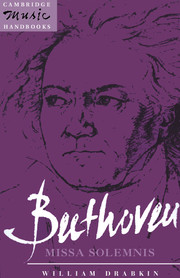1 - Critical perspectives
Published online by Cambridge University Press: 05 June 2012
Summary
What Walter Riezler once called ‘Beethoven's least approachable work’, one that had ‘been ignored by the commentators’ (1938: 187), has in fact attracted a good deal of attention since it was published in early spring 1827, within days of the composer's death. Indeed it is difficult to imagine how the musical world could avoid coming to terms with it. The Missa solemnis is the largest and longest non-stage work written by a composer who, before he began it, had already shattered the dimensional barriers of the symphony, the string quartet and the sonata. It also took him far longer to write than any other work, and its composition makes up a substantial part of his musical life. Its position in Beethoven's œuvre as the largest sacred work, and the only one dating from his last decade, makes it a music–historical document of inestimable value.
The Missa solemnis as religious experience
Though biographers and critics have been unable to ignore the Missa solemnis, their writings have, perhaps unsurprisingly, emphasized the work's monumental qualities rather than focussing on the details of the musical experience. For most early commentators, Beethoven's second setting of the Mass Ordinary offered an opportunity to catch up on the composer's relationship to the divinity.
- Type
- Chapter
- Information
- Beethoven: Missa Solemnis , pp. 1 - 10Publisher: Cambridge University PressPrint publication year: 1991



